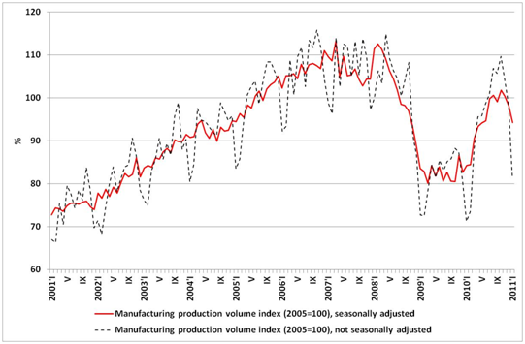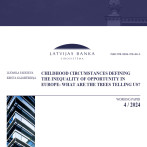Industrial forecasts cautious because of global events
According to the data of the Central Statistical Agency (CSP), the manufacturing output in January dropped 3.9 percent month-on-month by seasonally adjusted data: the third consecutive month of reduced output. The annual growth in manufacturing has thus dropped to 11.3% (data adjusted by the number of working days). Because of the relatively cold and snowy winter output has also dropped in mining industry (by 16.7%). In the electrical power and gas supply industry the output volume has dropped 0.1%.
Annual growth was retained in all the industrial subsectors except chemical (-40.1%), metal (-4.2%) and beverage (-0.6%) production. The greatest annual growth was registered in the production of wood pulp and its products (16.0%), clothing (44.6%), ready-made metal products (26.2%) and automobiles and trailers (109.8%).
In recent months (November and December 2010) the seasonally adjusted manufacturing turnover data indicated a drop in the sales of industrial production. Against the backdrop of shrinking retail turnover, the amount of production sold in the domestic market dropped 2.4% and 6.0% in November and December respectively. The export sales volumes of industrial production were very uneven in late 2010, dropping by 4.7% and 3.2% in October and November respectively and growing 4.8% in December. Such instability and the gradual drop in annual growth go hand in hand with the contracted growth in foreign demand expected this year.
The sales of manufacturing industry products in foreign markets amounted to 59.4% in 2010 (54.1% in 2009) of the total output, thus it will be external events that will by and large determine the amount of Latvian manufacturing industry in 2011 as well. At the moment, the external changes are characterized rather by risks than positive trends. Firstly, many of the EU member states are taking budget consolidation measures that may have the direct effect of reducing the demand for Latvian manufacturing industry production. The uncertainty is exacerbated by the fact that several EU countries (Spain, Portugal, Ireland, Greece) are being closely watched by the economic analysts, policy makers and media, for there is doubt as to the ability of these countries to refinance their debts. Secondly, the political developments also have their effect – the unrest in the countries of North Africa and the Middle East has given rise to a wave of panic in the global raw materials exchanges, which in turn has had the effect of rapidly rising prices of several raw materials. Further political shocks may push up the prices of raw materials even higher and cause a new wave of speculations at the exchanges. These factors create additional feeling of uncertainty regarding the stability of demand for export oriented manufacturers.
The seasonally adjusted industry confidence statistics compiled by the European Commission, which characterizes the future evaluation by enterprises are currently not available (because recalculations based on NACE 2 classification are taking place). The seasonally unadjusted industry confidence indicator compiled by CSP improved by 0.1 points in January and by an additional 6.7 points in February, mostly affected by the expectations of employment and output growth in the next three months. These data should be regarded with caution, however, as the confidence indicator values are also subject to seasonal fluctuations.

Ill. 1. Manufacturing industry dynamics
Textual error
«… …»






